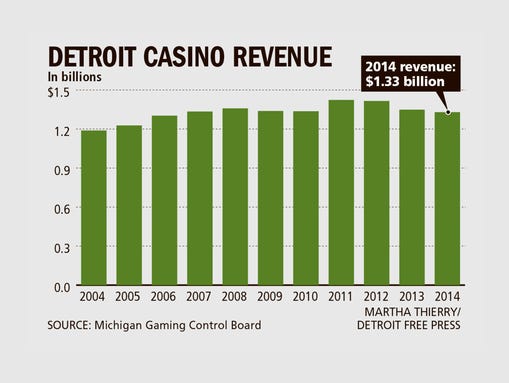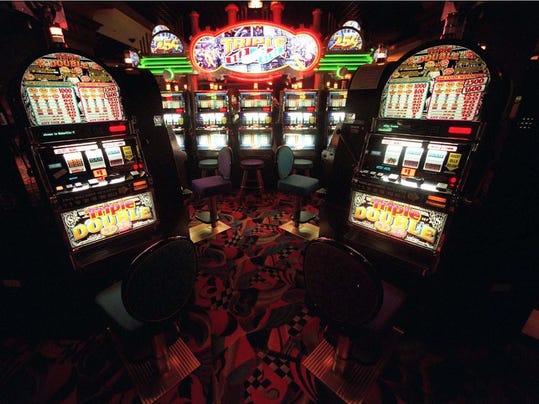Gambling revenues at Detroit's three casinos fell 1.2% last year as the local gaming market continued a path of decline, yet the recent big drop in gas prices could boost their fortunes this year.
Total revenues from gambling at MGM Grand Detroit, MotorCity Casino Hotel and Greektown Casino-Hotel came in at $1.33 billion in 2014, according to figures released Tuesday by the Michigan Gaming Control Board.
The three Detroit casinos have faced shrinking gaming revenues since 2012 amid increased competition from casinos in Ohio, Windsor and tribal properties. That decline could accelerate if proposed tribal casinos near Detroit Metro Airport and downtown Lansing are ever built.
However, a December uptick in business at all three casinos suggests that people could be ready to gamble more now that gas is back to around $2 per gallon.
If gas prices stay relatively low, the casinos could regain some of the business they've lost in recent years as consumers cut back on spending, said Alex Calderone, managing director of the Birmingham-based Calderone Advisory Group, a financial advisory firm.
"Anything that pinches the consumer is going to pinch the casino, and the opposite holds true as well," Calderone said.
 Buy Photo
Buy PhotoDetroit casino revenues fall again.(Photo: Detroit Free Press)
Richard Kalm, executive director of the gaming board, said the 2014 decline would have been worse but for an especially strong December. The three casinos were up 10.3% in December compared with 2013.
"We expected 2.5% to 3% (decline) for the year," Kalm said. "The 1.2% is certainly manageable."
The figures released Tuesday do not represent bottom-line financials for the casinos, as the casinos are not required to disclose their non-gaming revenues from sources such as hotel rooms, banquets and food sales.
Taxes from casino gambling represent about 16% of the city's total revenues, or just under $170 million. They have been a key money source for Detroit both in and out of bankruptcy.
In 2009 the city pledged its casino tax revenues as collateral for a soured $1.4-billion bond deal that was orchestrated in 2005 by former Mayor Kwame Kilpatrick and two big banks — UBS and Merrill Lynch-backed SBS Financial Products — for propping up the city's pension funds.
The city got out of that deal during its Chapter 9 bankruptcy and can now keep all of its share of the gaming tax proceeds.
Yet Detroit is still restricted to spending the money on specific purposes allowed under state law, including police and fire department spending, anti-gang programs, economic development and "other programs that are designed to contribute to the improvement of the quality of life in the city."
Competitors to the Detroit casinos have also experienced declines.
Revenues at Caesars Windsor have been running 1.2% below their previous annual levels, according to the latest figures available from the Ontario Lottery and Gaming Corporation.
And gaming revenues for the four Ohio casinos — totaling $809 million in 2014 — were down 1.4% compared with 2013, according to the Ohio Casino Control Commission. Hollywood Casino Toledo's gaming revenues were flat at $183 million for the year.
For all of 2014 in Detroit, gambling revenues were down 1% at MGM Grand, down 2.1% at MotorCity and down 0.5% at Greektown. Slot machines brought in 83% of the proceeds followed by table games at 17%.
Market share among the three for the year: MGM Grand 42%, MotorCity 33%, Greektown 25%.
Contact JC Reindl: 313-222-6631 or jcreindl@freepress.com. Follow him on Twitter @JCReindl.
Year-end gambling revenues for Detroit's three casinos:
2014: $1.33 billion
2013: $1.34 billion
2012: $1.42 billion
2011: $1.42 billion
2010: $1.37 billion
2009: $1.33 billion
Source: Michigan Gaming Control Board
Read or Share this story: http://on.freep.com/1IHbNGT
| < Prev | Next > |
|---|







 Copyright © 2025 ToCasino.net Online Casino. All Rights Reserved. Designed by
Copyright © 2025 ToCasino.net Online Casino. All Rights Reserved. Designed by